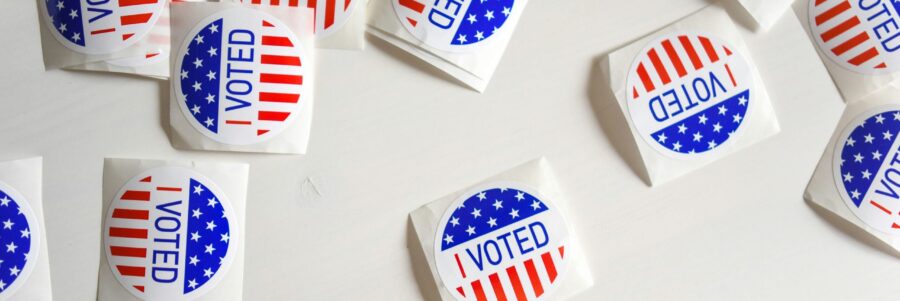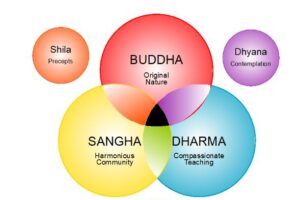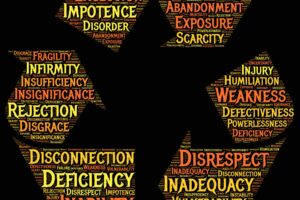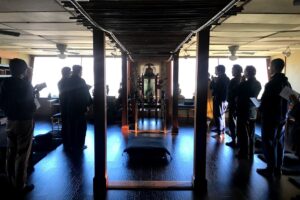V.O.T.E.
Vote for Buddha’s truth —
for compassion and wisdom;
vote for the future.
The DharmaByte™ version of this segment will post in the STO newsletter the first week of November. This UnMind podcast will drop on Wednesday after election day, which is November 5th. The next segment of Election Year Zen will be posted on December 4th, barring unforeseen circumstances such as an outright armed revolution — or “the new civil war” as it has been billed in some quarters — an implied threat depending upon the outcome of the election. In Zen, of course, all future circumstances are unforeseen by definition. Unless you believe in prophecy.
In this segment I will encourage you to vote, which I understand may not be necessary. Indeed, I have already voted. I have no desire to influence how you vote in terms of partisan politics, or in favor of which candidate or party conforms more closely to my own view. You should “vote your conscience,” in the current term of art. Or vote for the future — which seems contradictory to Zen’s “being in the moment.” Remember, in Zen we do not deny the possibility of the reality of karmic consequences occurring over the “Three Times” of Buddhism — past, future, and present.
Low voter turnout is a concern of the professionals in this election and has always troubled me somewhat. I mean, how important is all this political posturing, when a large segment of the populace does not even exercise their right to vote? I do not mean to suggest that 100% turnout would somehow cure the many ills that befall our system of elected government. For one thing the third or more eligible voters who fail to turn out are not likely to be informed on issues, or qualifications of candidates on the ballots, let alone cognizant of the long-term effects of their vote.
I feel confident, however, that readers of my DharmaByte™ column and followers of my podcast share a significant enough degree of concern, and have a sufficient grasp of the stakes in the outcome, to make intelligent and caring choices. Otherwise, you probably would not be listening to this.
As I mentioned in the last Election Year Zen segment, I believe the most important measure of merit for a party or candidate to take office is the degree of their conformance to the principles of buddha-dharma, as I understand them. Quoting myself:
I leave it to you to decide whether or not, and to what degree, your candidate for the highest office in the land, the most powerful secular position on Earth, are in harmony with these compassionate aspirations. But remember that the teachings of Buddhism were never meant to be held up to criticize others, but to reflect back upon yourself and your own behavior. The “mirror of Zen reflects all” — the good, the bad, and the ugly — without discrimination. You and your behavior are also reflected in that Precious Mirror.
President Jimmy Carter made news recently, first by surviving to his 100th birthday, then by declaring that he wanted to live long enough to vote, one supposes for the opportunity to elect a non-white non-male president for the first time in history. I met President Carter during his successful run for the presidency, when he visited the office of the consumer research company that I joined in moving to Georgia in 1970. What do you suppose is so important in his mind about this election, that he expressed his intent to vote for or against one of the candidates? As the former president most famous for his contributions to humanity after his term in office, what do you make of this kind of commitment to the democratic process? I think we can assume that he harbors a belief in the long-term viability of the benefits of the democratic republic for the future of the human race, on a larger timeline than the next four-year election cycle.
Let us turn back to the acronym: V-O-T-E, with which I titled the opening haiku poem. One interpretation that came to me is: “Vote Once for Time Eternal.” At my age, it becomes obvious that however I vote, it will probably have little effect upon my personal sphere, with what little future time I have left. But it raises a question.
What are we voting for, exactly? The current trope is, “for the children.” Commentators and candidates take up the theme, appealing to the sentiment or question of what kind of country we will leave for the next generations of children and grandchildren.
I suggest that we expand our time horizon to a relatively infinite scale. In the Lifespan Chapter of the Lotus Sutra, on which I gave a dharma talk recently, the point is that Buddha’s physical death, or Parinirvana, is only apparent. The truth is that Buddha is still here, forever, but cannot be seen by ordinary vision. Thus, what Buddha was, or is, has only a circumstantial and temporary connection to the person known as Siddhartha Gautama, the conditioned self of incarnation.
Similarly, can we look at the act of voting in this election in a larger context? Not in the light of its connection to the short-term effects it may or may not have on the social sphere in the immediate aftermath, but more in line with the long-term vision expounded by Buddha, or at least attributed to him by his successors? That is, from the perspective of the natural and universal spheres, in which the personal and social are nested? From the “Loving Kindness” or “Metta” sutra, we find the following passage:
Let no one deceive another nor despise any being in any state
Let none by anger or hatred wish harm to another
Can there be any clearer directive than this as to how to conduct ourselves in the social sphere? Another pair of admonitions comes from the second Five Precepts we receive in the Soto Zen Discipleship ceremony:
See only your own faults — Do not discuss the faults of others
Know self and other as one — Do not praise yourself at others’ expense
Can we see the current campaign in these terms? Which of the protagonists — if either — is adhering most closely to these guidelines? Which is most blatantly violating them? If we interpret all political dialog as equally duplicitous, equally guilty of deceptive and despising attitudes and behavior, equally wishing harm to others, discussing their faults, and praising themselves at the expense of others, then we have no basis on which to make a choice. But abstaining from voting is, in itself, making a choice. We are all complicit in, if not responsible for, the result.
This is not to put all our eggs in the one basket of the social sphere, and the limited sub-sphere of political opinion. We should not be distracted from the natural sphere, in which we are witnessing the long-term consequences of self-centered actions of the species for survival and comfort of an ever-expanding mass of humanity, particularly in the form of climate change. Nor from the universal sphere, where we face potential extinction in the context of the geologic time scale, wherein even the history of the human race appears as a blip on the screen. Why vote at all, when the forces shaping reality have so little regard for our place in it? Mother Nature is no respecter of persons, let alone political parties.
Returning to the personal, we can detach, on the level of the absolute, from any implications of the present political climate, while engaging in action — voting, for example — on the level of the relative, understanding that our deeper aspirations may not work out in this lifetime.
I think we can presume that Buddha’s teachings were not meant solely to affect his followers at the time, but to set the bar for future generations as well. Even though the members of the original Order did not record them in written form for posterity, they went to great lengths to codify and chant them, enabling their memorization and preservation from one generation to the next over a period of four centuries or so. What we are doing in Zen today is, I believe, carrying on this tradition, in the modern milieu and vernacular. We are taking the long-term view.
A careful reading of the founding documents of the American experiment, such as the Federalist Papers, the Declaration of Independence, the Constitution and its amendments, the Bill of Rights, et cetera, reveals a similar aspiration. Stated principles of freedom — the right to life, liberty, and the pursuit of happiness — do not represent temporary expedients, but hopeful wishes for the future generations of people operating on their own free will. Notwithstanding the contemporaneous exclusion of slaves and women from the privileges enjoyed by white men of means, owners of private property. Like much of our retrospective reading of the history of Zen, we have to resist our penchant for interpreting cultures of a couple of centuries or millennia ago as if they were occurring in the light of modern social science.
So vote. But I suggest doing so in the spirit of buddha-dharma. Realizing and embracing the reality that you may not see any beneficial effect on your personal life, at least not anytime soon. We take this approach to meditation, which is, after all, the inmost personal experience possible. We set aside expectations as to the positive effects it may bring about, while continuing to hold an aspiration to realization. We approach it with the famous “don’t-know-mind” of Zen, assuming that whatever comes of it will be the natural consequence of the manifestation of our Original Mind. We sit not because we have to, but because we get to. We vote, not because we have to, but because we get to. Master Dogen said somewhere that at last, we are left with ambiguity. Enjoy the non-knowing.









